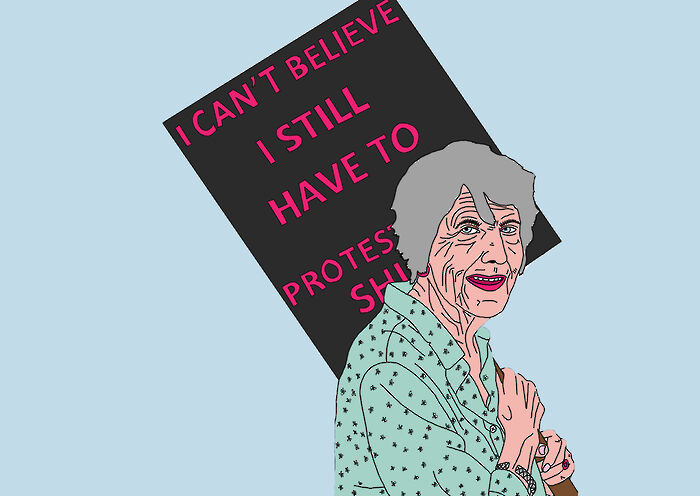Fandom, the highest stage of capitalism?
Siyang Wei reflects on fandom as consumer identity

Like many aimlessly passionate and socially stunted teens, I spent a lot of time on Tumblr in the late 2000s and early 2010s. And when I say a lot of time, I do mean a lot - getting back from school, logging on, and not logging off until either I went to sleep at 3am or my mum turned off the WiFi. What I wanted was a place to talk to people, to think about the things I was interested in, and to connect with others over our mutual interests.
Although perhaps a little embarrassing to admit, it’s also in some way because of Tumblr that I’m now studying Sociology; it was one of the first places I was really able to start reading about and engaging with social issues outside my own head. Mostly, as a possibly-gay British Chinese fan of sci-fi, fantasy, and other popular media, I wanted a place to belong.
If that sounds cliche, that’s because it is; like most cliches, it didn’t really come to resemble reality. It turns out that I wasn’t any better at making friends online than I was in ‘real life’, nor did I ever learn how to make softly-lit gifsets or photo manipulations or write very good meta. Still, though, I followed a lot of people who were friends (or at least frequently interacted) with each other, kept up with the major drama, and moved from fandom to fandom as various franchises fell in and out of widespread favour. I listed my interests on my ‘About’ page, re-blogged the right posts to mark out my positions, and read a lot (a lot) of fanfiction. I felt like I was a part of something counter-cultural, or at least sub-cultural.
Tumblr itself has been dying a long, slow death since about 2015, but fandom as a way of relating to cultural products and to others has only become more and more normalised. In Understanding Fandom, Mark Duffett states that while ‘fans’ were once “seen as an overly obsessed fraction of the audience,” fandom has now become a “central mode of consumption”. Communities of particular devotion are decades old or older, but developments in communications technology have made them much more widely accessible than the exclusively-physical fanzines and mailing lists of old. Even in just the past few years of life on the internet, film and TV fandom has migrated from more niche platforms such as LiveJournal and Tumblr into the relative ‘open’ of Twitter and mainstream media coverage. The consumption of music has followed a similar trajectory, with streaming in particular shaking up the Top 40. As a MIDiA Research report on music marketing put it, “niche is the new mainstream” - and for those in marketing, this is “an asset, not a challenge.”
As a possibly-gay British Chinese fan of sci-fi, fantasy, and other popular media, I wanted a place to belong
I got (and continue to get) a lot out of my engagement with fandom. For one, I’ve long been enamoured of the power of transformative works to use points of collective cultural reference as a springboard for exploring sexuality, personal trauma, and myriad other issues that generally go un- or poorly-examined. Relatedly, the fan spaces I’ve occupied have been dominated overwhelmingly by women, largely by LGBT+ people, and mostly by people slightly older than me; as such, they’ve often been spaces committed to reading and relating with a distinctly female, queer, and somewhat wiser gaze. And in some parts of fandom, preoccupation with excavating the relationship between fan and cultural product has taught me to read my relationship with the world more critically. So while I’m delighted that fervid investment is now cool, the media marketing industry also cheerleading this development makes my hackles rise a little.
With fan culture more intense and fragmented, it’s both easy and comforting to read this trajectory in isolation: misogynistic dismissal is on the ebb, while queer fandom’s work has paid off and our power is on the rise. At the same time, our pop cultural landscape is also increasingly marked by periodic bursts of reactionary fan backlash against the perception that some franchise or other, long considered the preserve of a ‘nerd’ fan culture dominated by white men, has sold out to ‘SJWs.' The apogee of this movement, of course, was 2014’s ‘Gamergate’ and the violent possessiveness over the output of the games industry exercised in relation to the hegemonically white, male ‘gamer’ fan identity. As parochial and petty as this episode may sound, its reverberations both material and symbolic have reached across cultural spacetime.
When researching this piece, I came across an academic article on Japanese pop culture titled You Are What You Buy. The author, Carolyn S. Stevens, positions fandom as “a rational consumer strategy, rather than a deviant psychological attribute, when considered within the hyper-developed context of a media-saturated, late-capitalist consumer society” in both Japan and the West. Fandom, as a result, can be understood not as a strange or pathological behaviour, but as a natural pleasure-seeking activity focused on “social capital” and “individualised identity building” — “especially in a society where traditional corporate groups such as the family or the workplace no longer offer the same attraction.”
Comfort, however, is not the same as healing
Despite our (vast) differences, what the Gamergater and I do share is that we live in a society where, increasingly, we are what we buy. This includes what we watch, read, and listen to; the vast and diverse array of merchandise now available for purchase; me, aged 14, and the para-social investments in media objects that constituted the most emotionally fulfilling relationships in my life. ‘Loneliness’ is the latest watchword of our society’s mental health crisis — a government Minister for Loneliness was appointed for the first time early last year. It’s clear to me, however, that the hyper-individualist alienation of neoliberal capitalism is its structural cause. The rise of fan-based identity, on the other hand, is another symptom: a sense of consumption-based belonging that can act as a comforting salve on our collective open wound.
Comfort, however, is not the same as healing. The frequently-invoked (pop) culture war framework conjures images of a pitched battle between ‘queer fandom’ interested in social justice and a reactionary fan identity over the soul of the culture industry. In reality what drives our culture industry is not a soul, but two basic functions of its place in late capitalism: to extract the highest amount of profit, and to keep us entertained and satisfied with the status quo. Media objects — celebrities, series, and franchises in particular — are intensely branded forms of consumption that are especially adept at cultivating a simulacrum of reciprocity. If we are loyal enough, invested enough, feel comfortable enough, we can begin to believe that these cultural products are in some ways for us. Creators and marketers therefore string us along, and we are inevitably betrayed when it turns out they were simply doing what it takes to keep us consuming.
At a very basic level, what the instigators of Gamergate rebelled against was the encroachment of others on (white male) ‘gamer identity’ — the beginnings of discussion about the representation of women and other marginalised groups in one of the last bastions of complete white male cultural dominance. But the increased inclusion of minorities has occurred less due to any liberatory spirit than because minorities can be consumers now too, and it makes financial sense to make us feel more comfortable as well. Particularly when exploitative micro-transactions are quickly becoming the dominant model for video game profitability, it’s obvious to me that these industries don’t care about fans beyond what they can be made to pay for. On the other hand, neither are the mainstreaming of ‘queer fandom’ or the strange phenomenon of ‘Woke Disney’ any expression of our power.
This is not to dismiss fandom as useless or to suggest that there is anything condemnably silly about my lingering investment in Chris Pine. What is dangerous to believe is that there is anything fundamentally radical or structurally progressive about the comfort of fandom either. I can (and do) read all the gay Marvel fanfiction I want, and maybe the actors will acknowledge fan theories with a wink and a nod — but this does not change the fact that the franchise is part of Hollywood’s long partnership with the Pentagon, exchanging access to funds and military equipment for final say over the script. If a film’s narrative doesn’t sufficiently align with US imperial interests, the Department of Defence can request edits or simply pull the plug.
The industry’s profitable sweet spot lies in our feelings of empowerment, investment, and belonging while not thinking to demand any real power at all. And I’m still a passionate fan of many things, but I also know that fan-based cultivation of identity manages the pain of a wound that only political and economic revolution can heal.
 News / Hundreds of Cambridge academics demand vote on fate of vet course20 February 2026
News / Hundreds of Cambridge academics demand vote on fate of vet course20 February 2026 News / Judge Business School advisor resigns over Epstein and Andrew links18 February 2026
News / Judge Business School advisor resigns over Epstein and Andrew links18 February 2026 News / University Council rescinds University Centre membership20 February 2026
News / University Council rescinds University Centre membership20 February 2026 News / Petition demands University reverse decision on vegan menu20 February 2026
News / Petition demands University reverse decision on vegan menu20 February 2026 News / Caius students fail to pass Pride flag proposal20 February 2026
News / Caius students fail to pass Pride flag proposal20 February 2026










